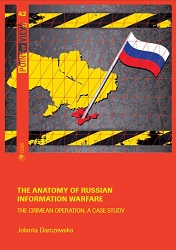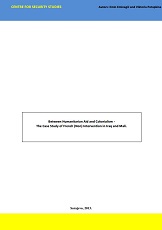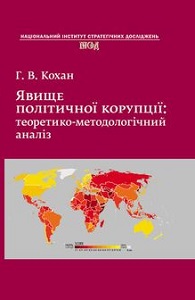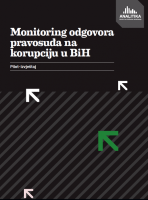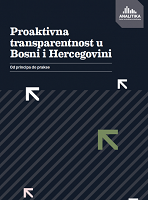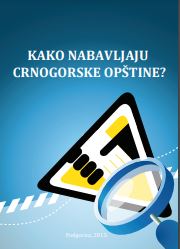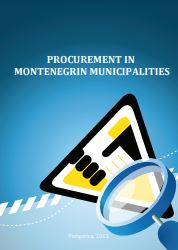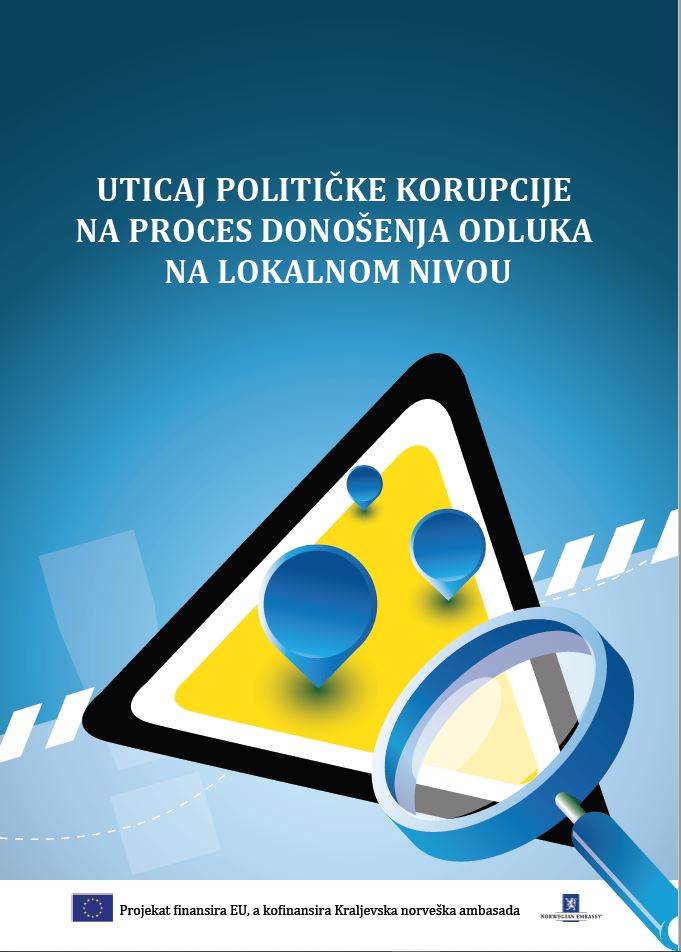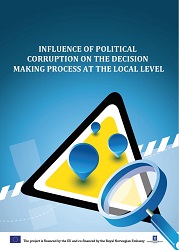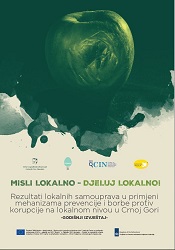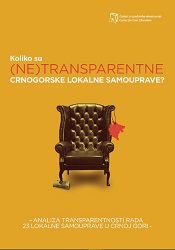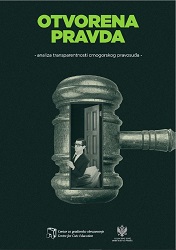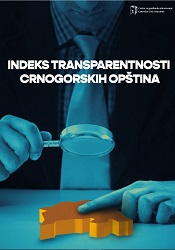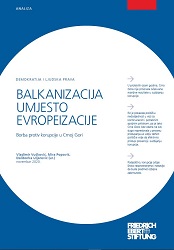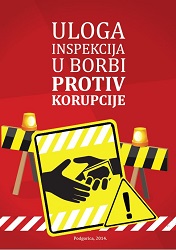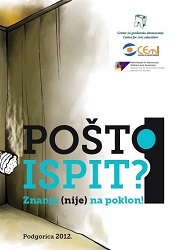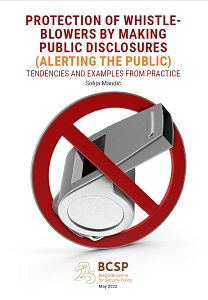Author(s): Dalida Burzić,Božidarka Dodik,Edin Hodžić,Selma Korlat,Amila Kurtović,Amra Mehmedić,Ermin Sarajlija / Language(s): Bosnian
Uprkos postojanju normativnog i institucionalnog okvira za suzbijanje korupcije, istraživanja su pokazala da u posljednjih dvadeset godina ona ostaje sveprisutna pojava u bosanskohercegovačkom društvu. Rezultati Indeksa percepcije korupcije (CPI) Transparency Internationala, koji mjeri percipirani nivo korupcije u javnom sektoru u zemljama širom svijeta, u kontekstu Bosne i Hercegovine (BiH) kontinuirano su nezadovoljavajući. Prema podacima za 2016. godinu, BiH se, od ukupno 176 država obuhvaćenih istraživanjem, nalazi na 83. mjestu. Prostor za optimizam ne nude ni nalazi Globalnog barometra korupcije Transparency Internationala za 2016. godinu, prema kojem 82% građana BiH rad vlasti u borbi protiv korupcije ocjenjuje negativno, svrstavajući zemlju među četiri najgore ocijenjene države u ovoj kategoriji, zajedno sa Ukrajinom, Moldavijom i Španijom. Ovakva statistika ne ide u prilog zahtjevima za integraciju BiH u Evropsku uniju, posebno imajući u vidu proširenje strukturiranog dijaloga o pravosuđu i na oblast korupcije, a koji uključuju usklađivanje antikoruptivnih zakonskih akata sa međunarodnim dokumentima u ovoj oblasti, te jačanje institucija koje imaju ulogu i ovlaštenja u borbi protiv korupcije. U tom smislu, posebno je značajna uloga pravosuđa, koje ima zadatak da, pored ostalog, vrši nadzor nad zakonitim djelovanjem svih drugih javnih institucija. Iz tog su razloga brojne inicijative domaćih aktera i međunarodnih donatora u prethodnoj deceniji bile usmjerene na pružanje podrške pravosudnim institucijama u postupanju povodom najkompleksnijih oblika kriminala, uključujući i predmete korupcije. Uprkos tome, nalazi iz posljednja tri izvještaja Evropske komisije o napretku Bosne i Hercegovine na putu eurointegracija ukazuju na to da je politička volja za borbu protiv korupcije i dalje nedostatna i uglavnom deklarativna. U tim izvještajima se također navodi da je ukupni nivo efikasnih istraga, krivičnih gonjenja i osuđujućih presuda za koruptivna krivična djela kontinuirano nizak, uz kaznenu politiku koja ne djeluje odvraćajuće na počinioce tih djela. Procesuiranje predmeta korupcije smatra se efikasnim ukoliko ih pravosudni sistem rješava na profesionalan i nezavisan način, bez nerazumnih odlaganja i zaostataka. Takvo postupanje i reagiranje pravosuđa u predmetima korupcije nužno je za ostvarivanje prava na pravično suđenje, ali je i preduslov za povjerenje građana u vladavinu prava i pravosudne institucije. No, to je istovremeno i dosta kompleksan zadatak. U Antikorupcijskom izvještaju Evropske unije navodi se da nedostatak kapaciteta, ali i odlučnosti pravosuđa u procesuiranju predmeta korupcije dovodi do pretjerano dugih postupaka, što u konačnici može rezultirati i zastarom tih predmeta. Osim toga, identificiran je i problem praktične primjene proceduralnih pravila na način koji može dovesti do značajnih odlaganja, koja su u nekim slučajevima usmjerena i na izbjegavanje okončanja sudskih postupaka. Efikasnost i kvalitet rada pravosuđa u postupanju povodom koruptivnih krivičnih predmeta u BiH je teško ocjenjivati, kada se uzme u obzir nedostatak pouzdanih, sveobuhvatnih i dostupnih podataka, te sistematične procjene kvalitativnog aspekta odgovora pravosuđa na korupciju. Godišnji izvještaji o radu Visokog sudskog i tužilačkog vijeća (VSTV), koji su dostupni javnosti, nude uvid u broj podignutih optužnica u predmetima korupcije, dok drugi bitni podaci, kao što su npr. broj pokrenutih istraga, potvrđenih optužnica ili pravosnažnih presuda u predmetima korupcije izostaju. Iako je tim podacima moguće pristupiti formalnim putem, po osnovu važećih zakona o slobodi pristupa informacijama, takav je pristup nedostatan za procjenu efikasnosti institucija u procesuiranju korupcije. Osim toga, formalni proces pristupa informacijama nerijetko je dugotrajan, što dodatno komplicira činjenica da VSTV u pravilu ne prikuplja niti sortira podatke koji se odnose specifično na procesuiranje korupcije pred pravosudnim institucijama u BiH. Ovaj izvještaj nastao je upravo iz potrebe da se praznina u pogledu dostupnih pouzdanih podataka u ovoj oblasti popuni. Temeljni cilj izvještaja jest na sistematičan i metodološki rigorozan način utvrditi kvalitet odgovora pravosuđa na korupciju u BiH. Izvještaj se zasniva na rezultatima istraživanja provedenog tokom 2016. i 2017. godine, u kojem su učestvovali predstavnici pravosudne zajednice u BiH, te nezavisni eksperti u oblasti korupcije, a čiji je osnovni cilj bio evaluirati rad pravosuđa na svim nivoima u BiH u postupanju povodom predmeta korupcije. Pored upotrebe kvantitativnih podataka o procesuiranju korupcije u BiH iz zvaničnih izvora (VSTVBiH), ovaj izvještaj prvi put nudi komplementaran uvid u sudsku praksu iz oblasti koruptivnih krivičnih djela. Analizom sadržaja optužnica i pravosnažnih presuda u odabranim predmetima korupcije, ovaj dokument omogućava dublje i sistematičnije razumijevanje izazova s kojima se pravosudni sistem suočava u oblasti procesuiranja korupcije, a posebno u odnosu na vlastite kapacitete da se nosi s tom kompleksnom problematikom. Konačno, izvještaj nudi novi, sveobuhvatni metodološki pristup za procjenu kvaliteta odgovora pravosuđa na korupciju, koji nadograđuje postojeće istraživačke napore u ovoj oblasti u BiH i drugim zemljama. Ovaj dokument ujedno predstavlja i prvi pilot-izvještaj, kao svojevrsni uvod u planiranu seriju redovnih godišnjih izvještaja o ovoj tematici. U tom smislu, ovaj izvještaj treba shvatiti kao važan, ali ne i posljednji korak u razvoju metodologije i u sistematiziranju podataka relevantnih za razumijevanje i ocjenu odgovora pravosuđa u BiH na korupciju, te će i metodologija i prezentacija nalaza svakako postati sofisticiranija u narednim godinama. U nastavku izvještaja najprije slijede opća razmatranja o rijetkim dostupnim istraživanjima i metodologijama koje se bave odgovorom pravosuđa na korupciju u BiH. Nakon toga se predstavlja problematika transparentnosti pravosuđa u ovoj oblasti, s posebnim fokusom na dostupnost informacija o postupcima za koruptivna krivična djela. U četvrtom poglavlju predstavljeni su rezultati statističke obrade podataka o procesuiranju korupcije u BiH u 2015. godini, nakon čega su prezentirani i rezultati analize konkretnih pravosudnih akata. Na kraju, zaključna razmatranja sumiraju ambiciju i ograničenja ovog istraživanja, kao i njegove ključne nalaze, te upućuju na daljnja istraživanja i analize koje je u ovoj oblasti neophodno provesti kako bi se bolje sagledao rad pravosuđa u BiH u domenu borbe protiv korupcije.
More...
